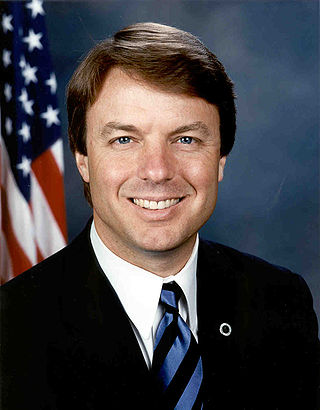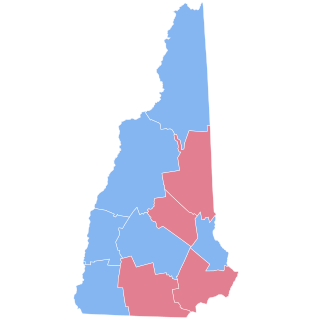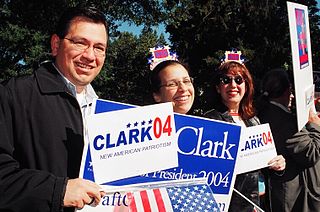
Richard Andrew Gephardt is an American attorney, lobbyist, and politician who represented Missouri's 3rd congressional district in the United States House of Representatives from 1977 to 2005. A member of the Democratic Party, he was House majority leader from 1989 to 1995 and minority leader from 1995 to 2003. He ran unsuccessfully for the Democratic nomination for President of the United States in 1988 and 2004. Gephardt was mentioned as a possible vice presidential nominee in 1988, 1992, 2000, 2004, and 2008.

Johnny Reid Edwards is an American lawyer and former politician who represented North Carolina in the United States Senate from 1999 to 2005. A member of the Democratic Party, he was the vice presidential nominee under US Senator John Kerry in the 2004 presidential election. He also was a candidate for the Democratic presidential nomination in 2004 and 2008.

From January 14 to June 8, 2004, voters of the Democratic Party chose its nominee for president in the 2004 United States presidential election.

The 2004 Iowa Democratic presidential caucuses were an election held on January 19 as part of the United States presidential primary. They were the first major test of some of the leading contenders for the Democratic Party's nomination as its candidate for the 2004 United States presidential election.

The 2004 presidential campaign of John Kerry, the longtime U.S. senator from Massachusetts, began when he formed an exploratory committee on December 1, 2002. On September 2, 2003, he formally announced his candidacy for the Democratic nomination. After beating John Edwards, Howard Dean, Wesley Clark, and other candidates in the primaries, he became the Democratic nominee, challenging Republican incumbent George W. Bush in the general election. Kerry selected Edwards as his running mate.
This is a timeline of events during the 2004 U.S. presidential election.

On March 2, 2004, Massachusetts Senator John Kerry became the presumptive Democratic nominee for president in the 2004 Presidential Election. Kerry selected North Carolina Senator John Edwards as his running mate on July 6, 2004. The Kerry–Edwards ticket was ultimately defeated by the Bush–Cheney ticket in the general election.

Robert M. "Bob" Shrum is the director of the Center for the Political Future and the Carmen H. and Louis Warschaw Chair in Practical Politics at the University of Southern California, where he is a professor of political science in the Dornsife College of Letters, Arts and Sciences. He is a former American political consultant, who has worked on numerous Democratic campaigns, including as senior advisor to the Kerry-Edwards campaign in 2004 and to the Gore-Lieberman campaign in 2000. Shrum wrote the famous speech Ted Kennedy gave at the 1980 Democratic National Convention conceding to and supporting President Jimmy Carter. He has been described as "the most sought-after consultant in the Democratic Party." Shrum served as speechwriter to New York Mayor John V. Lindsay from 1970 to 1971, speechwriter to Senator George McGovern's 1972 presidential campaign and speechwriter and press secretary to Senator Edward M. Kennedy from 1980 to 1984 and political consultant until 2009.

The 2004 United States presidential election was the 55th quadrennial presidential election, held on Tuesday, November 2, 2004. The Republican ticket of incumbent President George W. Bush and his running mate incumbent Vice President Dick Cheney was re-elected to a second term. They narrowly defeated the Democratic ticket of John Kerry, a United States senator from Massachusetts and his running mate John Edwards, a United States senator from North Carolina.

The 2004 United States presidential election in New Hampshire took place on November 2, 2004, and was part of the 2004 United States presidential election. Voters chose four representatives, or electors to the Electoral College, who voted for president and vice president.
The 2008 presidential campaign of John Edwards, former United States Senator from North Carolina and Democratic nominee for Vice President in 2004 began on December 28, 2006 when he announced his entry into the 2008 presidential election in the city of New Orleans near sites devastated by Hurricane Katrina. On January 30, 2008, Edwards returned to New Orleans to announce that he was suspending his campaign for the Presidency. On May 14, 2008, he endorsed Barack Obama at a campaign event in Grand Rapids, Michigan.

The 2004 United States presidential election in South Carolina took place on November 2, 2004, as part of the 2004 United States presidential election which took place throughout all 50 states and D.C. Voters chose eight representatives, or electors to the Electoral College, who voted for president and vice president.

From January 24 to June 6, 2000, voters of the Democratic Party chose its nominee for president in the 2000 United States presidential election. Incumbent Vice President Al Gore was selected as the nominee through a series of primary elections and caucuses culminating in the 2000 Democratic National Convention held from August 14 to 17, 2000, in Los Angeles, California, but he went on to lose the Electoral College in the general election against Governor George W. Bush held on November 7 of that year, despite winning the popular vote by 0.5%.

The 2004 presidential campaign of John Edwards, U.S. Senator from North Carolina, began on September 16, 2003.

The 2004 presidential campaign of Howard Dean, 79th Governor of Vermont, began when he formed an exploratory committee to evaluate a presidential election campaign on May 31, 2002. Dean then formally announced his intention to compete in the 2004 Democratic primaries to seek the Democratic Party's nomination for President on June 23, 2003. Dean dropped out of the race in February 2004 after a poor showing in the Wisconsin primary.

The 2004 presidential campaign of Dennis Kucinich, House Representative of Ohio and former mayor of Cleveland, began in February 2003, with a formal announcement made in June. Ralph Nader praised Dennis Kucinich as "a genuine progressive", and most Greens were friendly to Kucinich's campaign, some going so far as to indicate that they would not have run against him had he won the Democratic nomination. However, Kucinich was unable to carry any states in the 2004 Democratic Primaries, and John Kerry eventually won the Democratic nomination at the Democratic National Convention.

The 2004 presidential campaign of Wesley Clark, a retired U.S. Army general who served as Supreme Allied Commander Europe (SACE) from 1997 to 2000, officially began on September 17, 2003. A movement to draft Clark for the Democratic nomination began in April 2003, and was led by activists who felt Clark's military service and criticism of the War in Iraq made him a strong candidate. Prior to announcing his campaign, Clark was not known to have publicly identified with either party.

The 2008 presidential campaign of Evan Bayh, Democratic Senator and 46th Governor of Indiana, began shortly after the 2004 presidential election.
Since 1983, the Democratic Party of the United States holds a few debates between candidates for the Democratic nomination in presidential elections during the primary election season. Unlike debates between party-nominated candidates, which have been organized by the bi-partisan Commission on Presidential Debates since 1988, debates between candidates for party nomination are organized by mass media outlets.
Debates and forums took place between candidates in the campaign for the Democratic Party's nomination for the president of the United States in the 2004 presidential election. The Democratic National Committee sanctioned 6 debates out of 16 total.

















